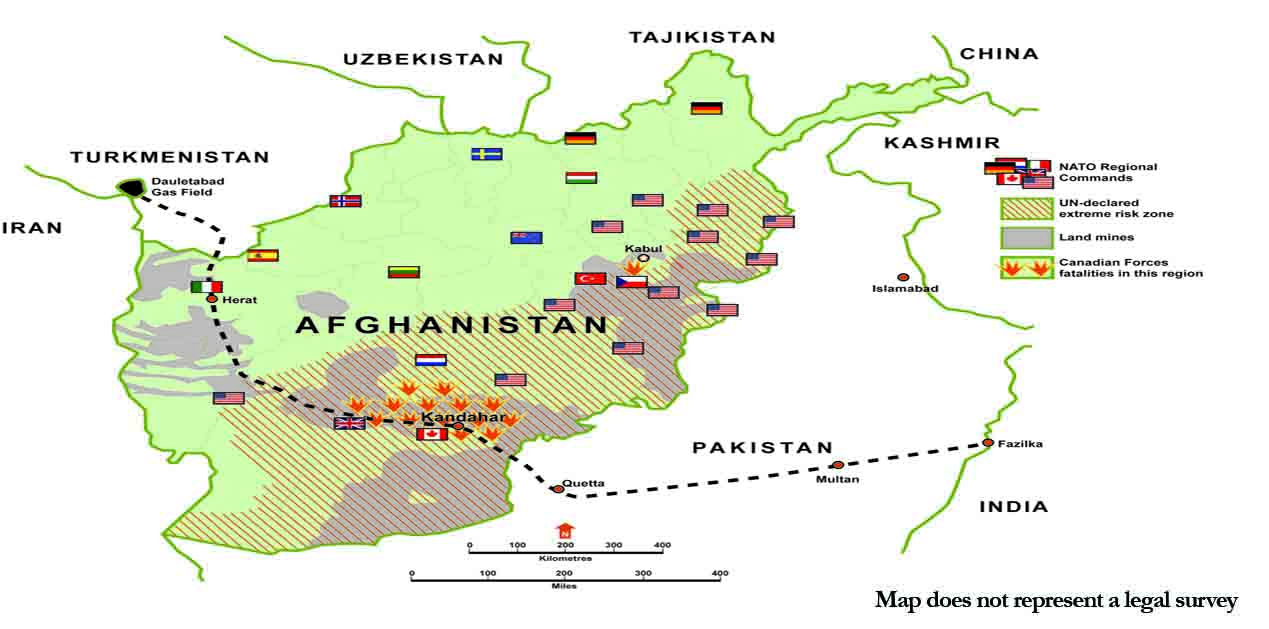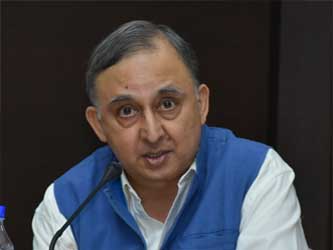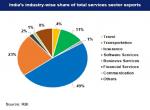In February 2018, leaders from Turkmenistan, Afghanistan, Pakistan and India inaugurated the 1700 km Turkmenistan-Afghanistan-Pakistan-India (TAPI) pipeline. Functions were held in Serhetabat and Herat with the leaders expressing hope that trade and mutual economic benefit could overcome old conflicts.
TAPI has been long in the making. A gas sale and purchase agreement was signed in 2013 for the pricing mechanism under which the price of gas at the Turkmenistan border would be about 20 percent cheaper than the price of Brent crude. Leaders of the four countries performed the ground-breaking of the project in December 2015. According to the agreement, Turkmenistan would invest around $25 billion to deliver 3.2 billion cubic feet of gas per day (bcfd) to Afghanistan, Pakistan and India. Of this, $15 billion will be invested in developing the gas fields whereas $10 billion would be spent on the pipeline connecting Afghanistan, Pakistan and India with Turkmenistan. Turkmenistan will bear 85 percent of the total cost of the pipeline with the remaining being shared by Afghanistan, Pakistan and India with 5 percent contribution each. Of the 85 percent cost, Turkmenistan will contribute 51 percent on its own and arrange the remaining 34 percent from varying financiers.
The pipeline that is expected to last for 30 years, would have a proposed annual capacity of 33 bcm of gas from Turkmenistan’s Galkynysh field. Off-take of gas by Afghanistan, Pakistan and India is expected to be 1.5 percent, 49.25 percent and 49.5 percent respectively.
In the 1990’s, the US supported an American company, UNOCAL, in its bid to build the TAPI pipeline across Afghanistan. The then US Assistant Secretary of State, Robin Raphael, was an ardent supporter of the Taliban who, at that time, controlled southern Afghanistan and they had assured protection for the pipeline. However, after the Taliban captured Kabul, reports about serious human rights violations started emerging, forcing the US to wash its hands off the project.
In the wake of the collapse of the Soviet Union, Pakistan perceived a strategic opportunity in Central Asia. Among the earliest to articulate this was Maj Gen Naseerullah Babar, Adviser, Internal Security/Home Minister, in Benazir Bhutto’s two governments. In an interview, he recognised that the Central Asian countries needed an Asian outlet, especially for oil and gas. ‘Pakistan’s geo-economic significance stems from its position at the junction of “three Asia’s” – West, Central, and South,’ he said.
Undoubtedly, Pakistan’s location between the energy surplus economies of Central Asia, and the energy deficient but growing economies of India and China has placed it in a strategic position. The fly in the ointment for Pakistan, however, is that without Afghanistan being on board, its grandiose ambitions would remain a pipe-dream. The logic of geography dictates that the TAPI pipeline has to transit through Afghanistan before entering Pakistan and thence to India.
Potential for economic dividends from the pipeline are huge. Apart from hefty transit fees, Pakistan needs the pipeline project, especially since the Iran-Pakistan pipeline has gone into limbo. In fact, Iran has recently presented Pakistan with a bill of $ 1.2 billion for violating the penalty clause of the 2009 Gas Sales Purchase Agreement and failing to take the gas it had contracted for. Moreover, Pakistan has had to go in for short-term Liquified Natural Gas (LNG) import contracts at more expensive rates due to gas shortages. The whole issue of LNG has also got mired in corruption charges in which prime minister Abbassi is allegedly involved.
Economic dividend of the pipeline is clear but it is here that politics comes in, and so far, politics has been trumping economic interests. For a considerable time Pakistan, instead of being focussed on its own economic growth, focused its ability on hampering development of India’s fast-growing economy by denying it energy resources – its more attractive proposition. It, therefore, opposed the extension of the pipeline to India. However, since the pipeline was not economically feasible without the Indian market, Pakistan had to accept having India on board.
The pipeline has several issues, the key one being, of course, its security in Afghanistan. The pipeline will pass through five southern Afghan provinces — Herat, Farah, Nimruz, Helmand and Kandahar. All these have been Taliban strongholds. Even between 2001 and 2014, when thousands of Afghan, NATO and US troops were deployed in these provinces, the security situation was bad. After their partial withdrawal from these areas, the security situation has deteriorated. It is a no-brainer that without durable peace in Afghanistan the TAPI pipeline will remain hostage to disruption. Without assured peace, very few investors would be willing to fund the $10 billion pipeline.
Thus it has been a matter of great relief all around that the Taliban have pledged support for the pipeline. A Taliban spokesman, Zabihullah Mujahid, said in a statement that coincided with the February inauguration, “We are not against the TAPI project but are supporting it, and we are ready to provide security for the project when it is needed.” He noted that the pipeline had been under consideration during the Taliban rule in Afghanistan. A breakaway Taliban faction led by Mullah Mohammad Rasool also said it would support the project and prevent domestic and foreign groups from jeopardising the prospects of its success.
For its part, apart from saying that it will secure the pipeline, the Afghan Government has approached the local population to garner their support in construction of the pipeline. During 2017, for example, it launched public awareness conferences along the route to explain the potential benefits of the pipeline to the masses. The response, apparently, was positive with local residents assuring support for the construction and operation of the pipeline. This would be critical element in making the project feasible.
The recent peace offer made by President Ghani is, according to Rashid, ‘the most open and comprehensive peace deal that has been offered by any Afghan Government over the last 10 years.’ Will it work? The sticking point even in this offer continues to be the question of the withdrawal of American forces. Without knowing how long the US would stay on in Afghanistan, the Taliban are unlikely to allow peace. For the US, the critical issue is ensuring the security of the Afghan Government before they can pull out. The Taliban probably realise that without some realistic peace plan the US would not leave Afghanistan. Hence, peace talks seem to have become a necessity both for the US and the Taliban. This could potentially bring them on the same page regarding Afghan security, though there could be many a slip between cup and lip.
The US has been supporting the TAPI pipeline. Among other reasons, it sees this as an alternative to the proposed Iran-Pakistan pipeline. It has the advantage of bypassing Russia enabling the Central Asian states to lessen their economic dependence on it. However, as noted Afghan expert Ahmed Rashid pointed out in a March 2018 interview to Daily Times, security situation in the region is indeed complex. Even if the Taliban are on board what about the Al Qaeda, the Pakistani Taliban, the Islamic State and the Baloch separatist? If they are not part of the deal, any or all of them could become spoilers.
Apart from the security situation, another key determinant for the success of the pipeline is the role of Pakistan. Since the 1980’s, Pakistan has projected itself as the central player in Afghanistan, dictating as to how it develops. Pakistan’s strategic interests in Afghanistan include minimising if not eliminating Indian influence there and ensuring that Afghanistan does not raise uncomfortable question about the Durand Line. Instability and a weak government in Afghanistan thus serves Pakistan’s interests. Despite protestations to the contrary, Pakistan’s objective is to install its own proxies in Kabul. Given its long-standing links to the Taliban, Pakistan will continue to hold a veto over any peace deal.
That is why being put on the ‘watch list’ of the Financial Action Task Force (FATF) becomes so crucial. If Pakistan plays ball in the Afghan peace process, it could get a reprieve. With even its friends like China and Saudi Arabia withdrawing their support on the issue of terrorism, the moot question is whether Pakistan perceives Afghan peace as an opportunity or not. If it does not, Pakistan could find itself on the ‘blacklist’ of the FATF that would involve sanctions, and put it in the company of North Korea and Iran. The writing is on the wall. With the international community coming together on terrorism, Pakistan’s room to manoeuvre is very limited. Will Pakistan recalibrate its policy of supporting terrorist groups?
Thus, the success of the TAPI pipeline hangs in the balance. Pakistan would have to make a major decision about its national interest: whether economic dividends would prevail or whether the security-driven mind-set would continue to dominate policy.
(Tilak Devasher is a former Special Secretary, Cabinet Secretariat, Government of India)
(Views expressed are of the author and do not necessarily reflect the views of the VIF)
Image Source: https://yaleglobal.yale.edu/content/trans-afghan-pipeline-initiative-no-pipe-dream










Post new comment